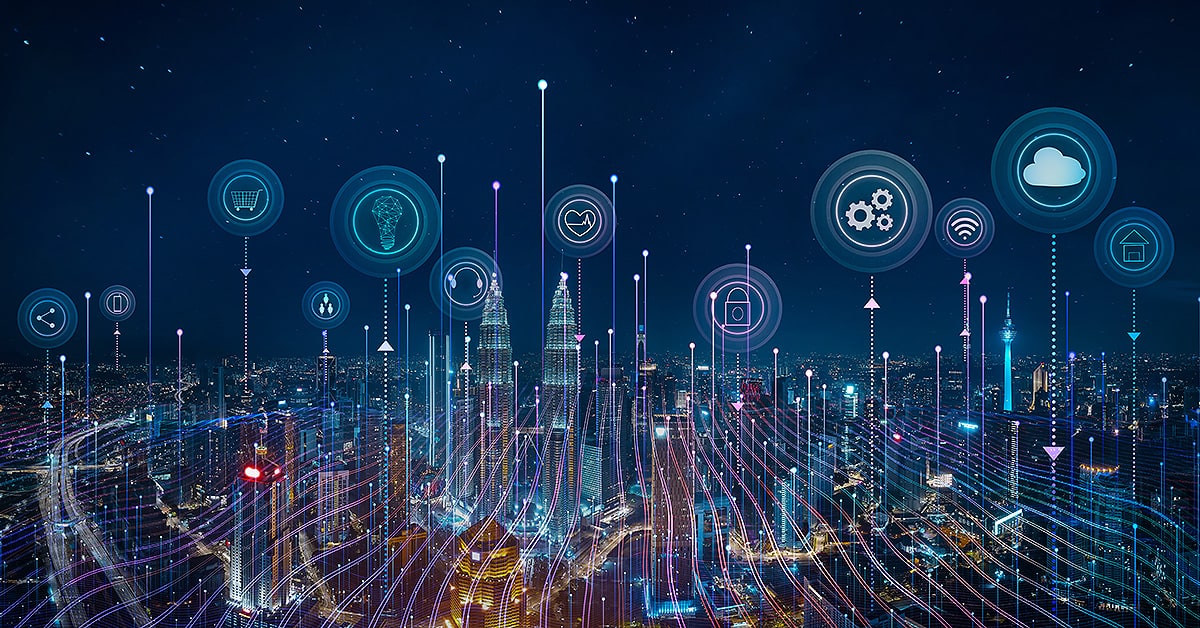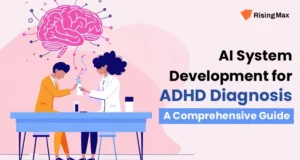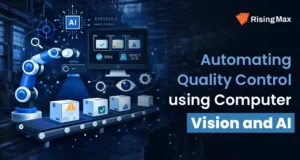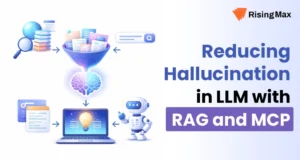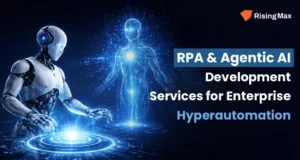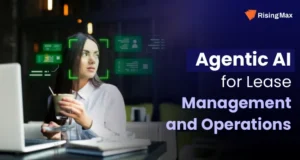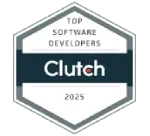The concept of Smart City has gained substantial traction in recent years. Digital technologies like AI, IoT, and blockchain play a major role in supporting the transformative shift in urban development.
Considering the challenges of the future urban population, tech-powered smart city solutions are paving for future generations’ quality of life. In the future, these technologies will push the smart city initiative to new heights. Anticipating future software development needs, entrepreneurs worldwide are investing in promising smart city solutions that promise to shape the cities of tomorrow.

Everything from urban planning to smart parking solutions and waste management systems to AI decision-making and other software will become critical in laying the foundation of smart cities. The integrated smart city software will ensure seamless data connectivity, a transparent decision-making process, and better resource allocation to meet the growing urban population’s needs.
As a reputable smart city software development company, we are assisting visionary entrepreneurs in transforming their ideas into reality. Our development team has been designing and developing smart city solutions to create a sustainable, connected, and tech-driven urban environment. Join hands and empower the future of urban living with cutting-edge software solutions for Smart Cities.
If you are psyched about smart cities and looking for important software development trends to watch out for in 2026, we have got you covered. In this post, we delve deep into the smart city software development trends that will reshape the future of smart cities.
So, without much ado, let’s start.
Smart City Software Development Trends For 2026
IoT Smart Parking System
The global smart parking market size is expected to grow at a CAGR of 13.6% (2022-30) and reach around 16.54 USD billion. (Globe News Wire
The above stats show IoT-based smart parking systems will become an important software development trend in 2026. The software allows users to find real-time vacant parking spots with integrated IoT sensors and devices, thus saving valuable time and fuel.
The software comes with advanced technologies like GPS, IoT, and in-built features like advance booking, navigation, multi-payment options, etc. Implementing IoT parking systems in smart cities allows users to find, book, and easily navigate to available parking locations. The wider implementation scope of the IoT smart parking system makes it ideal for;
- Government Buildings
- Residential Building
- Sports Stadium
- Municipality Councils
- Mega Retail Stores
- Shopping Malls
- Hospitals
- Educational Institutes
The increasing urban population and use of vehicles indicate that IoT-based smart parking systems make it an important smart city software development trend to watch out for in 2026.
Waste Management Software
The global waste management market is projected to grow at a CAGR of 5.4 percent (2023-30) and reach 1.96 USD trillion. (Statista)
Smart cities require intelligent and tech-driven solutions to revolutionize the waste collection and disposal process. The incumbent traditional waste management system and increasing volume of waste generation pose challenges for smart cities.
The next-gen technologies like AI and ML will pave the way for developing smart waste management systems essential for smart cities worldwide. AI-powered waste management systems will become a cost-effective and environment-friendly solution.
Smart cities can leverage these futuristic software solutions to automate waste collection and disposal. In 2026, budding entrepreneurs will likely invest in waste management systems, making it a notable smart city software development trend to watch out for.
Connect with our expert consultants, share your project details, and our adept team will swiftly provide a comprehensive smart city software development solutions.
Smart Healthcare Solutions
The global smart healthcare market is expected to grow at a CAGR of 12.8 percent during the forecast period of 2023 to 2030. (Globe News Wire)
In smart cities, smart healthcare solutions powered with cutting-edge technologies assist experts in the healthcare domain in managing their day-to-day operations. Leveraging advanced technologies like AI, IoT, and blockchain, smart healthcare solutions help effectively track and address bottlenecks and identify potential improvement areas.
Smart healthcare solutions have become a crucial smart city software development trend, providing users with easy, secure, and remote access to quality healthcare services. Integrated remote health tracking and monitoring allows healthcare professionals to modernize how they serve patients.
As a reputable custom healthcare software development company, we are developing and transforming innovative healthcare software ideas into reality. Want to empower smart cities with advanced healthcare solutions? Schedule an appointment and discuss your project idea under NDA.
Energy Management System
The energy management market worldwide is expected to grow at a CAGR of 11.32 percent (2022-28) and reach 15.1 USD billion in 2028. (Statista)
Smart cities need intelligent energy management systems to save and efficiently utilize electricity in private and public places. Powered with next-gen technologies like IoT, AI, and ML, the software accesses the lighting conditions, energy loads, electric devices, and energy requirements for efficient energy management
The energy management software can be implemented in public places like EV charging stations, shopping malls, and private places like apartments and houses to ensure efficient utilization of energy resources.
Further, the smart city energy management software can be integrated with renewable energy projects such as solar or wind energy. The software assists in real-time monitoring of energy production, equipment status, energy load management, asset management, and more.
The wider implementation scope and utility make energy management systems a promising smart city software development trend for 2026.
Smart Traffic Management
The global traffic control software market is projected to grow at a CAGR of 17 percent and reach over 15 USD billion by 2028. (Statista)
The smart traffic management software will create a paradigm shift in traffic management and regulation in smart cities. Next-gen technologies like IoT, 5G, and AI assist in creating a connected ecosystem for internet-connected vehicles, roads, and traffic lights to avoid congestion and smooth traffic movement.
In smart cities, IoT-powered traffic management software will majorly improve overall traffic flow, lower emissions, and enhance road safety. Moreover, valuable insights from smart traffic management systems, such as traffic movement, road congestion, traffic routes, and more, can be leveraged to make well-informed decisions during infra and urban planning.
Optimizing traffic flow and vehicle movement for sustainable urban planning creates a more livable and pollution-free environment. Thus, making it a notable smart city software development trend for 2026.
Smart Citizen Apps
The global smart citizen apps and community engagement platform market size is expected to reach 2057.98 USD million by 2030 at a CAGR of 15.92 percent (2022-30). (Sky Questt)
The digital smart citizen apps and community engagement platform will focus on creating an inclusive environment where everyone can participate. Smart citizen apps can increase voting participation, access healthcare facilities, explore career opportunities, and remote interaction with government officials.
The smart citizen software integrated with IoT sensors and cameras empowers citizens to report potential shoplifting, harmful activities, and more. In smart cities, digital citizen apps pave the way for citizens to join community-led initiatives and create meaningful impact with collaboration. Broadening citizen access and providing a medium to connect with officials remotely makes it a prominent smart city software development trend most entrepreneurs will be investing in. Connect with our subject matter experts to discuss your public sector software requirements today.
Blockchain-Based Software
Blockchain-powered solutions will play a major role in efficiently managing smart cities’ security and privacy aspects. In smart cities, blockchain technology assists in creating tamper-proof identity management systems, decentralized energy trading, EHR software, and public and private data management systems.
Blockchain-based smart city solutions assist in streamlining property management, mitigating fraud possibilities, smart contracts for financial transactions, and improving transparency. The technology will pave the way for collaboration between government, businesses, and communities to support the system for efficient working of smart cities.
-
- Tamper-proof data storage: The immutability of blockchain makes it an ideal technology to build data storage solutions for smart cities.
- Support community-driven initiatives: The transparent nature of blockchain technology assists in developing platforms that support community-driven initiatives and foster collaboration between government & people.
- Secure identities: Blockchain-powered smart city solutions assist in creating secure identities to prevent fraud and mitigate the possibility of identity theft.
- Transparent supply chain:>/b> In smart cities, blockchain-based software helps create a transparent supply chain to provide authentic and tamper-proof products to end-users.
AI-powered Urban Planning Software
Reports from Guidehouse Insights predict that the smart city AI market is projected to grow at a CAGR of 28.2 percent (2023-32) and generate 6.5 USD billion by 2032.
AI-driven urban planning is revolutionizing the way cities are designed and managed. AI-powered software can analyze large amounts of data to identify patterns and trends, helping planners make informed decisions related to managing traffic, housing development, energy consumption, and public safety. Analyzing large chunks of data assists in better decision-making, increased efficiency, enhanced sustainability, and greater public engagement.
AI can identify optimal areas for development, considering factors like soil quality, accessibility, and potential environmental impact to ensure sustainable and long-term beneficial construction. AI can help cities optimize energy consumption and improve their environmental impact by identifying buildings that could benefit from energy-efficient retrofits. AI can model the impact of urban development on the environment, providing valuable insights for sustainable city development.
AI has the potential to revolutionize urban planning, making cities more efficient, sustainable, and livable. The growing influence of artificial technology in different business verticals makes it an impactful smart city software development trend.
Digital Farming Solutions
The global digital farming market is expected to reach 56.80 USD billion by 2030, growing at a CAGR of 13 percent during the forecast period 2022-30. (Globe News Wire)
The future smart cities will require digital farming solutions to revolutionize farming activities in and around cities. The digital farming solutions powered with next-gen technologies like IoT, AI, and 5G provide farmers with accurate information such as soil moisture, temperature, weather forecast, humidity, and more. Leveraging this information, farmers can make data-driven decisions like fertilization and pest control.
The digital farming solutions analyze historical weather conditions and crop data for making decisions related to crop rotation and plantation schedule. Investing in smart digital farming solutions increases overall crop yield and quality, allowing smart cities to feed the growing urban population.
As a leading agriculture software development company, we empower agrotech businesses worldwide to start their digital transformation journey.
Conclusion
With this, we conclude our smart city software development trends for 2026 and beyond. All the above-mentioned smart city software trends will play a significant role in setting up smart cities. Leveraging cutting-edge technologies like AI, IoT, and blockchain, smart city software will create an ecosystem for efficient transportation, urban planning, resource allocation, waste management, and public collaboration.
Additionally, smart city solutions with a combination of more than one technology, such as AI and IoT or blockchain and IoT, are expected to serve a wider audience base and stay competitive.
Keeping an eye on cutting-edge technologies and smart city software development trends is a great way to start your entrepreneurial journey in 2026. With a clear vision, well-defined project scope, and determination, we can help you build an innovative software solution for the smart world ahead.

